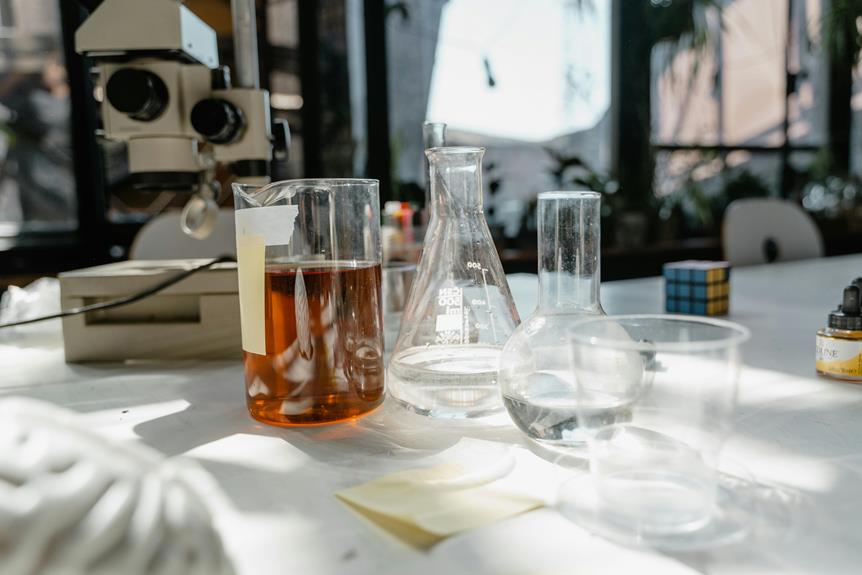
As a young scientist in the making, you're about to embark on a journey filled with discovery and experimentation. Imagine stepping into a school science lab, surrounded by various tools and equipment designed to unlock the mysteries of the natural world. But which essential lab tools will become your trusted companions in this scientific voyage? Stay tuned to uncover the key instruments that will not only aid your exploration but also ensure your safety and precision in conducting experiments.
Safety Gear
When working in the science lab, it's crucial to wear proper safety gear to protect yourself from potential hazards. The most essential safety gear includes safety goggles to shield your eyes from chemicals or flying objects. Always remember to securely fasten them before conducting any experiments.
Additionally, wearing a lab coat can safeguard your skin and clothing from spills or splashes of chemicals. Make sure it's buttoned up to provide full coverage.
Gloves are another vital piece of safety gear to prevent direct contact with harmful substances. Choose the appropriate gloves depending on the experiment you're conducting; for example, use heat-resistant gloves when dealing with hot materials.
Closed-toe shoes are a must to protect your feet from spills or broken glass. Moreover, tie back long hair and avoid wearing loose clothing that could accidentally catch fire. By following these safety precautions and wearing the necessary gear, you can enjoy conducting experiments in the science lab while staying protected.
Measuring Tools
To accurately conduct experiments in the science lab, you must utilize precise measuring tools. These tools are essential for obtaining accurate and reliable data in various scientific investigations.
One of the most common measuring tools used in labs is the graduated cylinder, which is used to measure liquid volumes with high accuracy. Another crucial tool is the electronic balance, which provides precise measurements of mass. Measuring spoons and cups are also vital for measuring specific quantities of solid or liquid substances.
For length measurements, a ruler or a meter stick is indispensable. Moreover, a thermometer is necessary for measuring temperature changes in experiments.
These measuring tools play a fundamental role in ensuring the success and accuracy of scientific experiments conducted in the lab. By using these tools correctly, you can obtain precise measurements, analyze data effectively, and draw accurate conclusions based on your findings.
Observation Equipment
Using specialized observation equipment is crucial for carrying out accurate scientific observations in the lab. One essential tool for observation is the microscope. By magnifying tiny objects, microscopes allow you to see details that aren't visible to the naked eye.
Another important piece of equipment is the telescope, which helps you observe distant objects in space. Magnifying glasses are handy for closer inspection of small items, making details more visible.
Additionally, binoculars are useful for observing objects at a distance with both eyes, providing a clearer and more immersive view. Cameras and camcorders are essential for capturing visual data during experiments. They allow you to document findings and share observations with others.
Thermometers and weather stations are also important observation tools for measuring temperature and weather conditions accurately. Overall, having access to a variety of observation equipment enhances your ability to conduct thorough and precise scientific investigations in the lab.
Experimentation Supplies
Experimentation in the science lab requires a range of supplies to conduct hands-on investigations effectively. One crucial item is a set of glassware, including beakers, test tubes, and graduated cylinders, for measuring and mixing liquids accurately. You'll also need a variety of basic chemicals like acids, bases, and indicators to perform various experiments. Don't forget about safety equipment such as goggles, gloves, and a lab coat to protect yourself during hands-on activities.
Additionally, having a balance or scale is essential for measuring mass and conducting quantitative analyses.
For more advanced experiments, consider investing in a microscope to observe tiny organisms or structures, and a Bunsen burner for heating substances. Thermometers are necessary for measuring temperature changes, and pH meters can help you determine the acidity or alkalinity of a solution. Lastly, having a supply of common lab items like pipettes, stirring rods, and filter paper will make your experimentation process smoother and more efficient.




